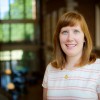Hello from the collections side of SCA, where we work on appraising, organizing, and describing physical, digitized, and digital primary sources. A covid-19 collections plan is drastically different from a normal one, as you might imagine. During a normal school year, between four and eight students work on collections processing and description projects aimed at improving access: by making new finding aids available online or improving the physical and intellectual access of collections that need updating. This year, in July after four months working entirely from home, I returned to campus to regroup, evaluate the status of collections in process, and complete the work of SCA’s student assistants that had been stopped before spring break – while also preparing to manage remotely working students, creating and overseeing metadata description, assisting with reference, and maintaining work on other ongoing projects.
Over the summer, ZSR Library staff in SCA and other departments contributed to metadata creation for our Baptist State Convention of North Carolina collection. Thanks to their willingness to be trained about metadata creation and to spend time listening to these audio tapes, Library employees described more than 125 audio files over the summer while doing other work amid their other work and life duties.
When it comes to their work in our department, SCA’s students assistants have made the most of this strange time. Two, Emily Talamas and Erin Byrd, who normally work with Preservation Librarian Craig Fansler in his lab, have become proficient metadata creators. Together they described more than 200 audio files from the Baptist State Convention of North Carolina collection and 360 photographs from our University Archives Photographs Collection. That work could not have been done without Digital Collections Librarian Melde Rutledge, who makes sure that the files are accessible to students so they can listen or look and describe – thank you Mel! Because of everyone’s work, our digital collections will be more searchable and thus more usable by a gamut of users: University personnel, students, scholars, people at home looking for sermons by speakers or specific topics in a time of fewer church services, and everyone in between.
Another pair of students, Immanuel Eggers and Caroline Fahringer, have been working on moving information from paper files – well, a 2000+ page PDF of those files – into finding aids for individual Baptist churches across North Carolina. Thanks to their work, details gleaned from past archives workers will now be found by a new world of users. And another group of our student assistants have been working primarily on reference work and assisting with reference inquiries via chat messages.
As for collection updates outside of all this amazing metadata work, working virtually has allowed more time for editing finding aids that had been in the pipeline; I am now on campus two days a week and am able to do a bit of work with collections then, as well. SCA has been able to publish a small amount of new finding aids during this time. Several more have been updated with more robust biographical or historical information, thanks to the research chops of our faithful volunteer Nancy Sullivan. SCA is grateful for the many hands that help us provide collections to y’all.
Newly available manuscript collection finding aids via WakeSpace include:
- Albert S. Hale Audio Recordings (MS682)
- Dover Baptist Church (Mount Airy, N.C.) Records (MS667)
- Eugene Benjamin Hager Papers (MS681)
- Henry Smith Stroupe Papers (MS576)
- James Gordon McDowell Papers (MS371)
The following record group finding aids are newly available via WakeSpace:
- Administration and Planning. WFDD Radio Station Records (RG39.11)
- Annotated General Catalogue by University president Charles E. Taylor and others (RG1.6)
- Babcock School of Management Dean Records (RG18.1)
- Faculty Organizations. Humanities Club Records (RG9.1)
- General University Organizations. Museum of Man Records (RG13.5)
- Reynolda House Museum of American Art Records (RG51.2)
- Administration and Planning. Dining Services Records (RG39.41)
- Student Organizations. Wake Forest Missionary Society Records (RG8.6)
Many more metadata descriptions and other collections work is in our future for this semester, as SCA employees continue to do our work mostly virtually. See you at Digital Collections for now!

3 Comments on ‘A Year(ish) at Home, Working on Collections’
Such great work Stephanie! Thanks for everything you have done, including training Erin and Emily to pivot from archival boxes to metadata. You’ve done a great job of continuing your productivity during these uncertain times.
Thanks Stephanie, and thanks SCA students and Nancy!
It is really interesting to me to see how different parts of the library world made adjustments to do more work from home and still produce results that are useful to researchers everywhere!